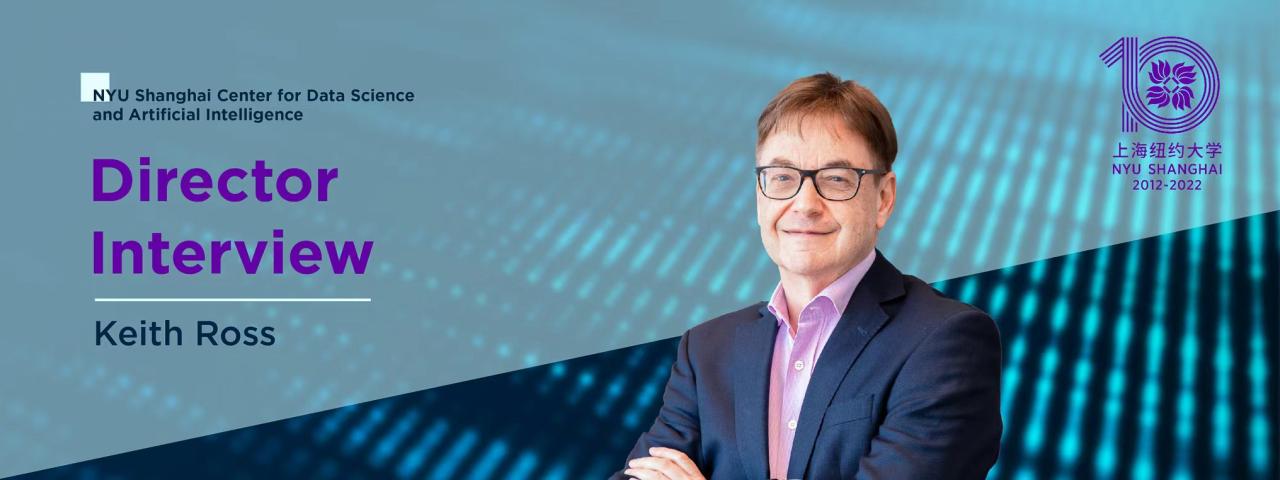
Machine learning, deep learning, computer vision, natural language processing. No matter in which form, one thing is for sure: data science and artificial intelligence (AI) are changing the world we live in. Established in 2015, NYU Shanghai's Center for Data Science and Artificial Intelligence aims at advancing the university's goal of creating one of the world’s leading data science/AI education and research facilities.
Recently, Center Co-Director Keith Ross, Dean of Computer Science, Data Science, and Engineering discussed the center's development, research focus and his insights on emerging technologies.
Could you give us a general picture of the center?
The center is co-directed by Dean of Business Chen Yuxin and me. Our primary purpose is to bring together faculty, postdocs and PhD students who work in data science and/or AI at NYU Shanghai, and foster collaboration by encouraging interdisciplinary exchanges. Our center boasts a diverse group of 12 core faculty members and 11 affiliated faculty members from a range of disciplines, including Computer Science, Business, Biology, Neuroscience, Chemistry, Physics, Math, Humanities, and Urban Science.
Our center fully supports academic activities and research initiatives, including seminars, workshops, conferences, and collaborative projects. We're also committed to providing our researchers with the resources they need to conduct their studies, including access to a state-of-the-art high-performance computing facility. Each year, we allocate funds to upgrade the facility with new computing nodes.
What does the center's research focus on and why? In which areas do you intend to expand collaborations?
In general, we want to focus our research on contemporary and unsolved problems in the field, and share our results with the world through publications in international venues and publicly available open-source software. Our current emphasis is on deep learning, a branch of AI, and the mathematics of data science, and we aim to develop those areas more and try to make fundamental advances. We believe that deep learning is perhaps the most important scientific advance so far in this century, and is leading to many fundamental changes in healthcare, education, business, transportation, and in society in general. In computer science, as in any other discipline, there are areas that come into fashion and go out of fashion. Deep learning and AI are very much in fashion, and will remain so throughout this decade, perhaps longer.
Looking ahead, we intend to expand collaborations with other fields, starting with physicists in the area of quantum computing. The potential impact of quantum computing on data science and AI is immense and we're interested in working with physicists to design new machine learning algorithms for quantum computers. Another potential area of collaboration is with psychologists specializing in animal and human learning. Possibilities are that machine learning can benefit from the insights and knowledge gained from studies in these areas. Additionally, we're particularly interested in fostering "data-driven humanities," using data tools to advance research in the humanities and social sciences. To that end, we'd like to encourage greater involvement from researchers in these fields.
In recent years, emerging technologies such as AI have generated heated social debates. How should we prepare for a world that might be redefined by these technologies?
All new technologies bring certain social and ethical concerns to the table. AI is no exception, as it presents potential challenges such as societal AI bias, privacy infringement, and job displacement. Here at NYU Shanghai, we would like to see more consideration of these issues in both our research and teaching. We're having some preliminary discussions about incorporating technology ethics into the AI-oriented courses already.
Despite these challenges, AI is bringing many positive changes to the world. For example, advances in machine translation has enabled people from different countries and cultures to communicate and better understand each other. Recent advances in using deep learning to solve the protein folding problem will lead to new treatments for life-threatening diseases, and AI-powered glasses are enabling people with vision impairments to "see" their surroundings through the recognition system. This is just one example of how AI is improving the lives of many people and has the potential to benefit many more.
In general, I think we should accept that new technologies are here to stay and that they will inevitably shape the world we live in. We better learn to live with them. At the same time, we must understand their shortcomings and actively address them.

